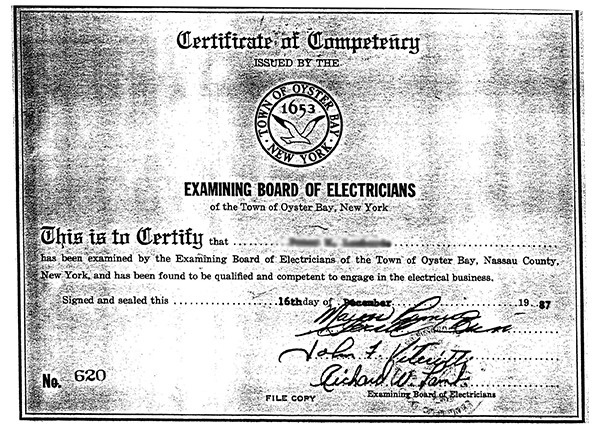What is a Master Electrician?
I see an incredible amount of misconception, misinformation, fraudulent claims, and just overall a great deal of confusion about. A licensed electrician or “Master Electrician” is one who has satisfied all of the necessary National Electric Code testing requirements, carries the necessary insurance, and has been in the industry for a satisfactory period of time as required by the particular jurisdiction covered by the license.
It is a very time intensive, and often expensive, process to obtain a master electrician license. It comes with tremendous responsibility. A master electrician has to pay for the license renewals each year, stay current with the codes, and hold the necessary insurance at all times. The goal of this article is to highlight what it takes to become a master electrician. I also want to explain some of the burdens and some of the benefits that come with it. I hope this will benefit readers looking to hire a licensed electrical company and those who look to join the ranks of us master electricians.
The Process:
Time In
The process to obtaining a master electrician license begins with satisfying the time requirement in the industry set forth by the particular jurisdiction. By particular jurisdiction, I’m referring to the actual issuer of a particular master electrical license. For example, in some areas, a single electrical license covers multiple states, and in other areas, such as Long Island, NY, one needs to hold 15 licenses. The time requirement is at least 7 years of the last 10 years in the trade, I’ve seen up to 9 years required. To clarify, this does not consist of a candidate going to the jurisdiction and proclaiming that they’ve been in the industry for 7 years, the time reflected must be backed up by social security records as well as W2’s that show the candidate working for a licensed company.
If you’re an “off the books” employee, you’ll need to get on the books if you ever hope to hold a license. This is done to promote good business practices and integrity among license holders. A fun fact that I love telling people is that if one completes a bachelors degree and then pursues an electrical license as many do today, it will take that person the same amount of time as it could take to become a surgeon (11 years).
Insurance
The second pre qualifier is that the candidate must currently hold insurance. This varies from jurisdiction to jurisdiction. It typically includes a liability policy ($2,000,000 here on Long Island), workers compensation policy, and sometimes a disability policy. This is not cheap. A small company could easily be paying $50,000 per year on insurance.
Master Electrician Test
The test is usually the only part most people think about. For some licenses, the licensing board conducts an interview with the applicant. The licensing board will approve or deny the candidate to take a written and practical test based on the National Electric Code (NFPA NEC). One could meet the time requirement yet be denied by the licensing board for a variety of reasons. The written test is typically a 2 hour test and varies by jurisdiction. Some are strict to the current NEC, some are calculation intensive, and some are based off of electrical knowledge from the 1960’s. Some tests are open book and some are not. The more difficult tests require candidates to know which section in addition to the answer without use of the book. Keep in mind the NEC is over 1000 pages.
After the candidate passes the written test, they will then take a practical exam. The practical examination usually involves wiring complex relay systems, bending conduits, and a variety of other more advanced techniques. Should the candidate pass all of the above, they recieve a Master Electrician License.

Burdens:
So the time, test and insurance is no big deal and you’re on your way to becoming a master electrician. Before you get too excited, let’s discuss some of the burdens and responsibilities that come with it.
Overhead
License and insurance renewals are an obvious one. Depending on the term for each license, they require periodic renewal including continuing education, some each year. This always includes paying a fee and sending current workers compensation, general liability, and disability insurance policies. Usually there are some passport photos and notarized forms that you’ll need to send as well. As of recently, the completion of a continuing education program is required as the codes are always changing. I’m personally a fan of this.
Master Electrician Vs. General Contractor
By far, the absolute most aggravating occurrence among the ranks of master electricians is the confusion with general contractors. An electrical contractor holds a master electrician license (not just by the county or parish), and performs ONLY electrical work. A general contractor has a “license” by the county to perform home improvement work EXCLUDING plumbing and electric.
As we just discussed, it takes quite a long time, adept skill, knowledge, and insurance to become a master electrician. To obtain a “home improvement license” you need $200 and a small insurance policy. The process does not take much time. There are no prerequisites, and there is no test for the candidate to provide proof of skills of any kind. This business license in no way allows one to legally do any electrical work. You don’t want to be the homeowner who has a house fire and attempts to justify that you didn’t know that the person wasn’t an electrician. With that said, there are also some absolutely amazing general contractors out there. These guys face these problems much more frequently than a licensed electrician.
As a licensed electrician, you are liable for anything you touch and any hazards you become aware of. For example, you are asked to replace a bathroom fixture and then discover the existing wires are not rated to 75℃ or whatever the fixture requires the existing wires to be rated at. These wires must be replaced before installation! Something like this is not open to interpretation. Should a customer have a handyman perform this work, they are liable for any damages that could result (fire). Should a licensed electrician perform this work, the electrician is liable.
Benefits:
The benefits of being a master electrician might not appear to weigh well against the burdens but then again someone earning a master electrician license is very likely passionate about what they do. Overall, a master electrician license paves the way for an individual to take the next step in the electrical industry. The first and most obvious benefit is the fact that you can now do licensed work and use your license to obtain underwriters certificates from electrical inspection companies. This is something (depending on the area) that only a master electrician can do. Some regions require permits for various types of projects that only a master electrician can file for. A master electrician license also enables one to become self employed or start an electrical company with electricians working under the supervision of the license holder.
Having an electrical license opens the door for more clerical work, away from the physical labor side of the business. I know of a few master electricians who work for property management companies, they help plan and manage projects locally and between states. Large union companies typically need a few master electricians on staff to oversee projects and obtain permits and insurance as well.
Conclusion
I hope this article was able to shed some light on what it takes to be a master electrician. If you’re just starting out in the electrical field, or looking to begin a career in the electrical industry I highly recommend all of Mike Holt’s resources. If you’re in need of a master electrician, look no further than our National Electrical Registry. We’ve compiled all of the master electricians in America and put them in one place.
Thanks for reading



